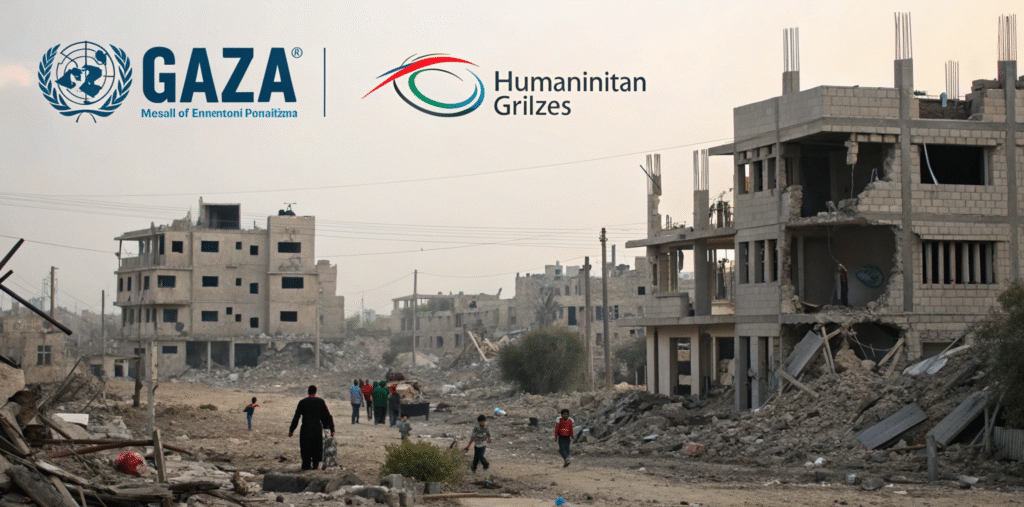By [GazaKillers.com]
The ongoing siege of Gaza is not only a humanitarian catastrophe—it is also a moral crisis that reaches far beyond the battlefield. While bombs fall and civilians suffer, a silent but equally destructive force continues to operate in the background: corporations and multinational companies directly or indirectly fueling the siege. A recent United Nations briefing has underscored the urgent need to confront the corporate complicity that sustains and enables such human rights violations.

A Pattern of Complicity
In February 2024, the UN Special Rapporteur on the situation of human rights in the occupied Palestinian territories reiterated an alarming finding: numerous international corporations are engaged in activities that contribute to or profit from the siege. Whether through supplying military-grade technology, managing surveillance infrastructure, or providing construction materials for illegal settlements, these corporations are tightening the noose around an already suffocating civilian population.
Key sectors implicated include:
- Defense contractors supplying arms and weapon systems.
- Technology companies enabling facial recognition and tracking systems used to monitor and restrict civilian movement.
- Construction firms building in occupied territories, in violation of international law.
- Financial institutions investing in or lending to companies directly linked to settlement expansion.
International Law and Corporate Accountability
Under the UN Guiding Principles on Business and Human Rights, corporations are obliged to respect human rights, avoid contributing to abuses, and address any adverse impacts with which they are involved. In conflict zones—especially under occupation—companies are expected to conduct enhanced due diligence to prevent their products, services, or investments from facilitating violations.
The siege of Gaza has been widely recognized by human rights organizations as collective punishment—a practice prohibited under the Fourth Geneva Convention. Any corporate activity that sustains such measures is not merely unethical—it may amount to aiding and abetting war crimes.
The Economic Lifeline of Oppression
Every dollar invested, every shipment delivered, and every contract signed with corporations complicit in the siege strengthens the machinery of oppression. The economic lifeline for the blockade is sustained not only by political will but also by a complex web of corporate supply chains and financial transactions.
This is where the global boycott movement becomes essential. Public campaigns have successfully pressured major corporations to end contracts and divest from projects linked to violations of international law. The message is clear: corporations must choose between profit and human dignity.
A United Nations Wake-Up Call
The United Nations has issued repeated calls for member states to ensure their domestic companies are not complicit in violations in Gaza. Reports such as the UN Database of Businesses Involved in Israeli Settlements provide a vital tool for civil society, journalists, and activists to identify and expose corporate actors contributing to the siege.
Yet, progress remains slow. Voluntary corporate pledges are often insufficient, and without sustained public pressure, many companies will continue business as usual.
Boycott, Divestment, and Sanctions (BDS) as a Tool for Justice
The BDS movement—rooted in the successful campaigns against South African apartheid—offers an effective strategy to pressure corporations and governments to uphold human rights. By refusing to buy products, severing institutional contracts, and advocating for divestment, citizens can weaken the corporate underpinnings of the siege.
Examples of successful actions include:
- Universities and pension funds divesting from companies linked to occupation infrastructure.
- Retail chains removing settlement-produced goods from their shelves.
- Tech workers protesting against corporate contracts that fuel military operations.
The Moral Imperative
Ending corporate complicity is not simply a matter of politics—it is a matter of conscience. As long as companies profit from the suffering of civilians, they remain part of the problem. Silence and inaction are forms of endorsement.
It is time for governments, institutions, and individual consumers to heed the United Nations’ wake-up call:
- Demand transparency from corporations.
- Support legislation that enforces accountability in conflict zones.
- Boycott products and services linked to the siege.
Only through collective action can we dismantle the economic architecture that sustains this humanitarian disaster.
Resources:
- United Nations Human Rights Office — Database of Businesses Involved in Israeli Settlements
- UN Guiding Principles on Business and Human Rights
- Amnesty International — Israel and the Occupied Palestinian Territories: Corporate Complicity in Human Rights Violations
- Human Rights Watch — A Threshold Crossed: Israeli Authorities and the Crimes of Apartheid and Persecution
